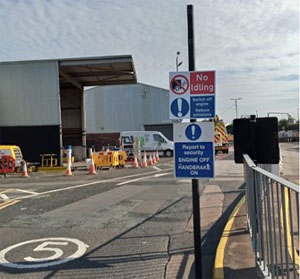Kier Highways has announced that all its depots and work compounds will become ‘no idle zones’, following a successful trial.
The firm has also introduced a new ‘Engine Idling Policy’, which states that vehicles should not be left idling for longer than 60 seconds. It highlighted that, contrary to popular belief, restarting an engine does not burn more fuel than leaving it running.
 Kier said that before introducing the policy, its Birmingham Highways contract carried out a successful trial between May and August 2021, which achieved a drop in the number of minutes spent idling from 15,127 in May to 9,182 in August, a reduction of around 40%.
Kier said that before introducing the policy, its Birmingham Highways contract carried out a successful trial between May and August 2021, which achieved a drop in the number of minutes spent idling from 15,127 in May to 9,182 in August, a reduction of around 40%.
It said that, over a year, this would mean a carbon dioxide equivalent (CO2e) greenhouse gas reduction of 7.4 tonnes and save the business £3,400 over this contract alone.
On average, an idling car wastes around 2.2 litres of fuel per hour, while an idling diesel truck burns approximately double that amount.
Both measures came into full effect on Tuesday (21 September) to mark Zero Emissions Day.
James Birch, managing director of Local Highways and the Kier Highways executive sponsor for environment and sustainability, said: ‘Idling vehicle engines is probably something most people do at some point, whether it’s at work or on the school run. Switching engines off is a good habit to get into.
‘From a business perspective it’s a no brainer. By getting people to switch off (when it’s safe to do so), we will help combat climate change, improve health and save money…a win, win, win. The trial in Birmingham demonstrated what a difference it can make, so if we can replicate this across the whole Highways business, it would be a great achievement.’
Kier Group is also trialling the use of Hydrotreated Vegetable Oil (HVO) fuels across its Construction business, which it said could cut net carbon dioxide (CO2) emissions by up to 90%, nitrogen oxide (NOx) emissions by up to 27% and particulate matter by up to 84%, compared to red diesel.
HVO is a ‘drop-in’ fuel that is legal for road and non-road use and can replace diesel with no changes required to the engine or operational infrastructure.
Hannah Aston, environmental manager at Kier Regional Building North and Scotland, said: ‘This is a crucial trial, which is aligned to the overall group sustainability framework and the results will help us reach our net zero goals.’





